Social Science
VerifiedAdded on 2022/12/05
|15
|3647
|454
AI Summary
This document discusses the concepts of social science, value emphasis, norms, sanctions, innovation, retreatism, social progress, social conflicts, and sociological perspective. It also explores the benefits and liabilities of sociological perspective and the concept of the 'power elite' as described by C. Wright Mills.
Contribute Materials
Your contribution can guide someone’s learning journey. Share your
documents today.
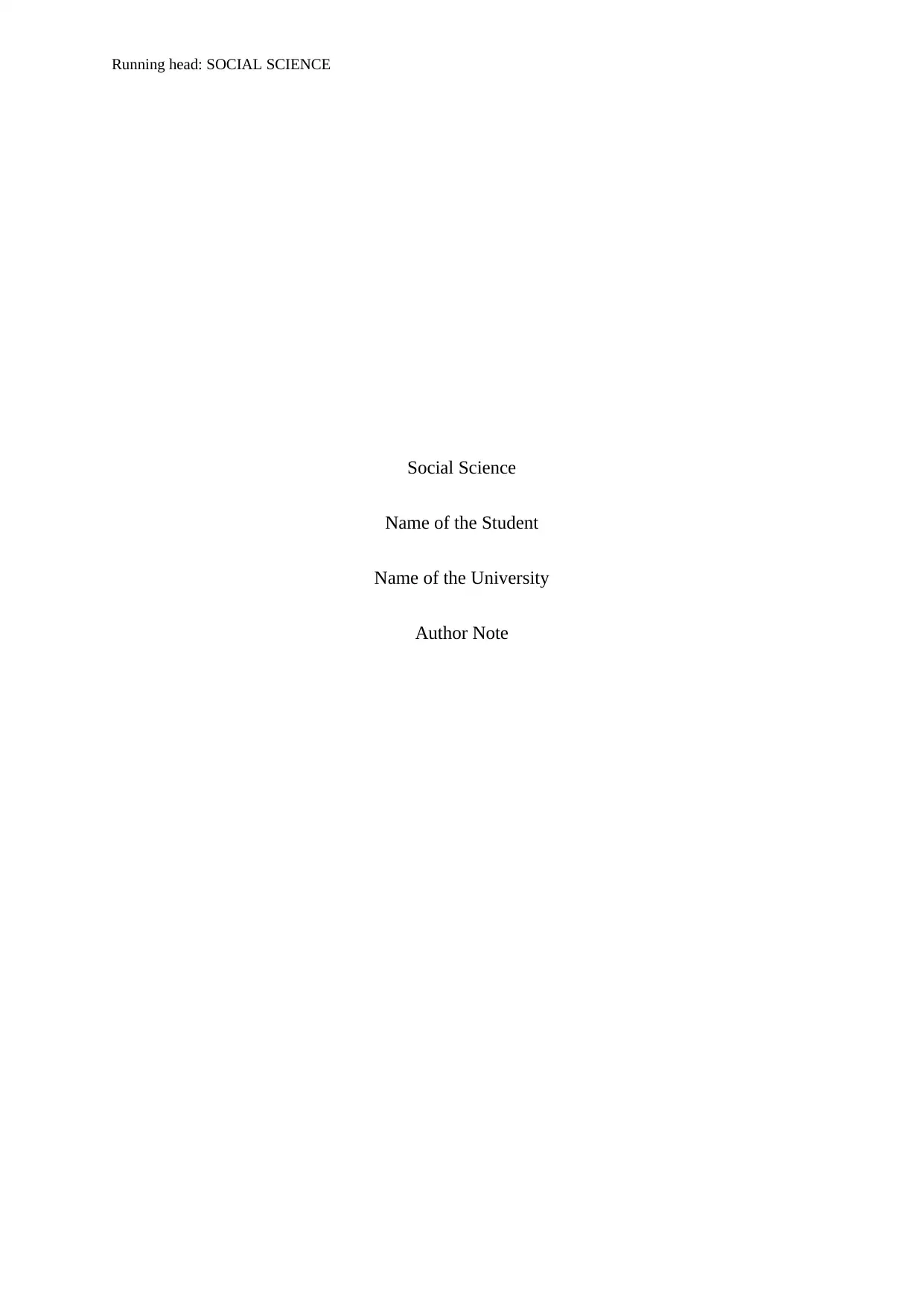
Running head: SOCIAL SCIENCE
Social Science
Name of the Student
Name of the University
Author Note
Social Science
Name of the Student
Name of the University
Author Note
Secure Best Marks with AI Grader
Need help grading? Try our AI Grader for instant feedback on your assignments.
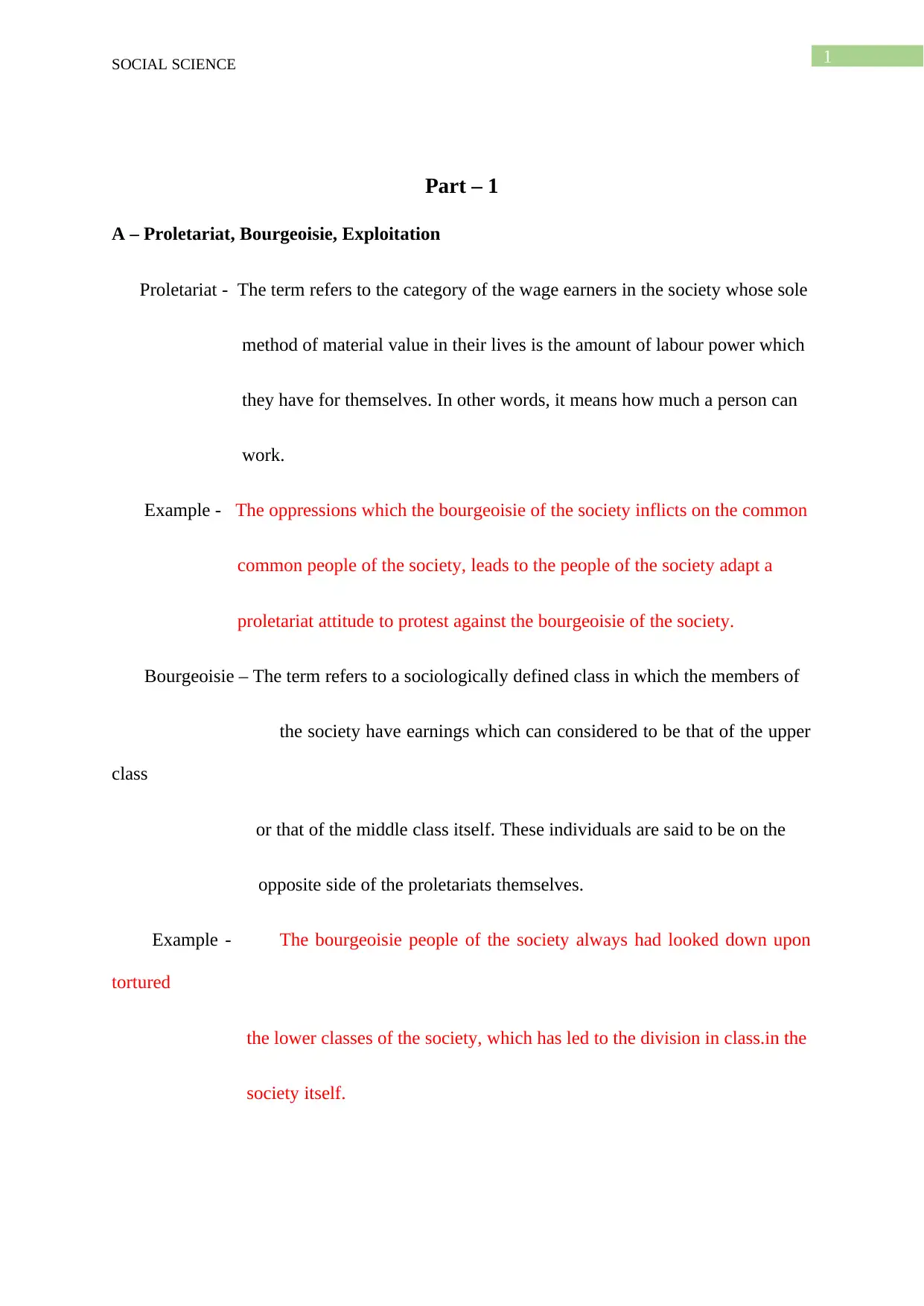
1SOCIAL SCIENCE
Part – 1
A – Proletariat, Bourgeoisie, Exploitation
Proletariat - The term refers to the category of the wage earners in the society whose sole
method of material value in their lives is the amount of labour power which
they have for themselves. In other words, it means how much a person can
work.
Example - The oppressions which the bourgeoisie of the society inflicts on the common
common people of the society, leads to the people of the society adapt a
proletariat attitude to protest against the bourgeoisie of the society.
Bourgeoisie – The term refers to a sociologically defined class in which the members of
the society have earnings which can considered to be that of the upper
class
or that of the middle class itself. These individuals are said to be on the
opposite side of the proletariats themselves.
Example - The bourgeoisie people of the society always had looked down upon
tortured
the lower classes of the society, which has led to the division in class.in the
society itself.
Part – 1
A – Proletariat, Bourgeoisie, Exploitation
Proletariat - The term refers to the category of the wage earners in the society whose sole
method of material value in their lives is the amount of labour power which
they have for themselves. In other words, it means how much a person can
work.
Example - The oppressions which the bourgeoisie of the society inflicts on the common
common people of the society, leads to the people of the society adapt a
proletariat attitude to protest against the bourgeoisie of the society.
Bourgeoisie – The term refers to a sociologically defined class in which the members of
the society have earnings which can considered to be that of the upper
class
or that of the middle class itself. These individuals are said to be on the
opposite side of the proletariats themselves.
Example - The bourgeoisie people of the society always had looked down upon
tortured
the lower classes of the society, which has led to the division in class.in the
society itself.
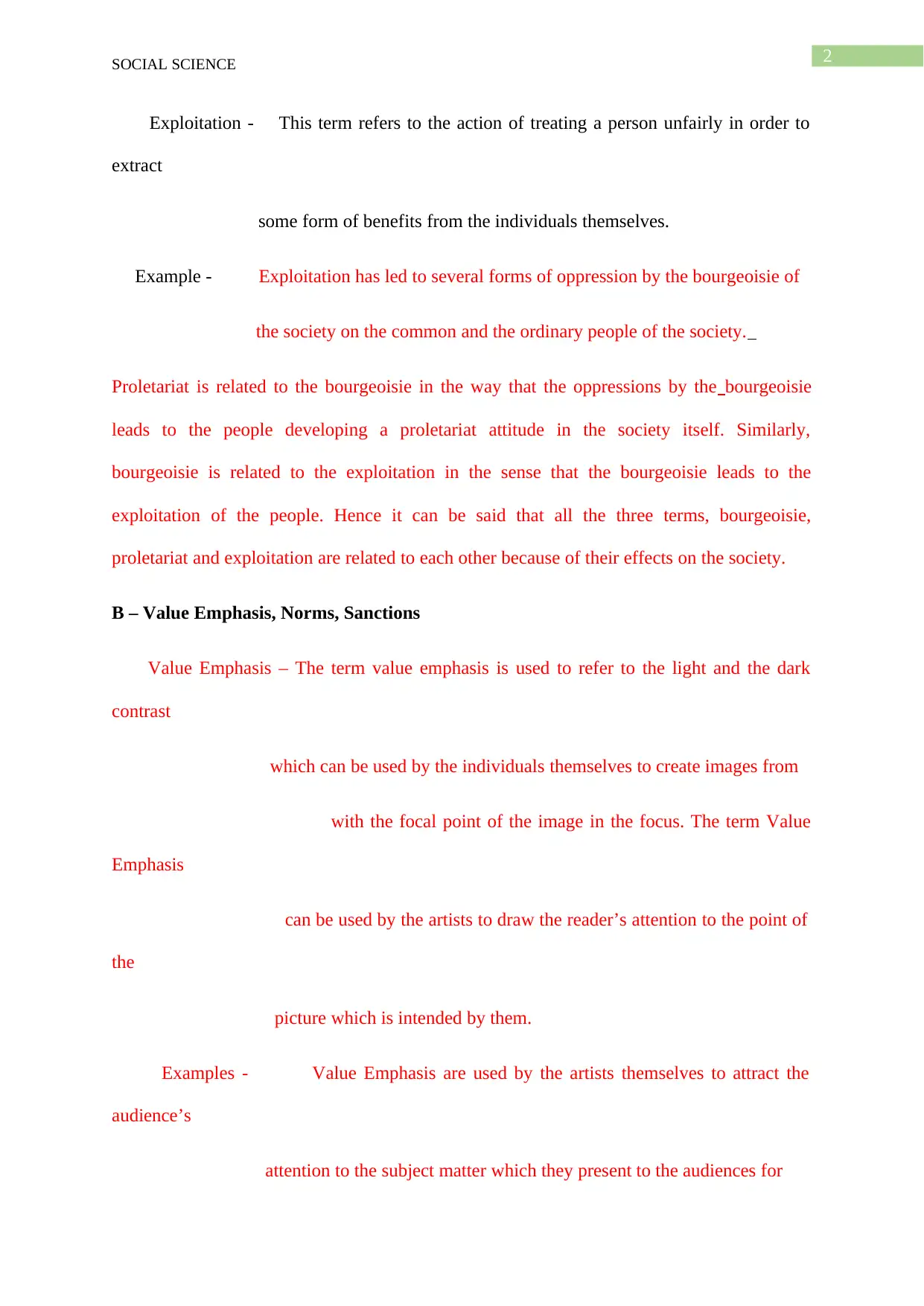
2SOCIAL SCIENCE
Exploitation - This term refers to the action of treating a person unfairly in order to
extract
some form of benefits from the individuals themselves.
Example - Exploitation has led to several forms of oppression by the bourgeoisie of
the society on the common and the ordinary people of the society.
Proletariat is related to the bourgeoisie in the way that the oppressions by the bourgeoisie
leads to the people developing a proletariat attitude in the society itself. Similarly,
bourgeoisie is related to the exploitation in the sense that the bourgeoisie leads to the
exploitation of the people. Hence it can be said that all the three terms, bourgeoisie,
proletariat and exploitation are related to each other because of their effects on the society.
B – Value Emphasis, Norms, Sanctions
Value Emphasis – The term value emphasis is used to refer to the light and the dark
contrast
which can be used by the individuals themselves to create images from
with the focal point of the image in the focus. The term Value
Emphasis
can be used by the artists to draw the reader’s attention to the point of
the
picture which is intended by them.
Examples - Value Emphasis are used by the artists themselves to attract the
audience’s
attention to the subject matter which they present to the audiences for
Exploitation - This term refers to the action of treating a person unfairly in order to
extract
some form of benefits from the individuals themselves.
Example - Exploitation has led to several forms of oppression by the bourgeoisie of
the society on the common and the ordinary people of the society.
Proletariat is related to the bourgeoisie in the way that the oppressions by the bourgeoisie
leads to the people developing a proletariat attitude in the society itself. Similarly,
bourgeoisie is related to the exploitation in the sense that the bourgeoisie leads to the
exploitation of the people. Hence it can be said that all the three terms, bourgeoisie,
proletariat and exploitation are related to each other because of their effects on the society.
B – Value Emphasis, Norms, Sanctions
Value Emphasis – The term value emphasis is used to refer to the light and the dark
contrast
which can be used by the individuals themselves to create images from
with the focal point of the image in the focus. The term Value
Emphasis
can be used by the artists to draw the reader’s attention to the point of
the
picture which is intended by them.
Examples - Value Emphasis are used by the artists themselves to attract the
audience’s
attention to the subject matter which they present to the audiences for
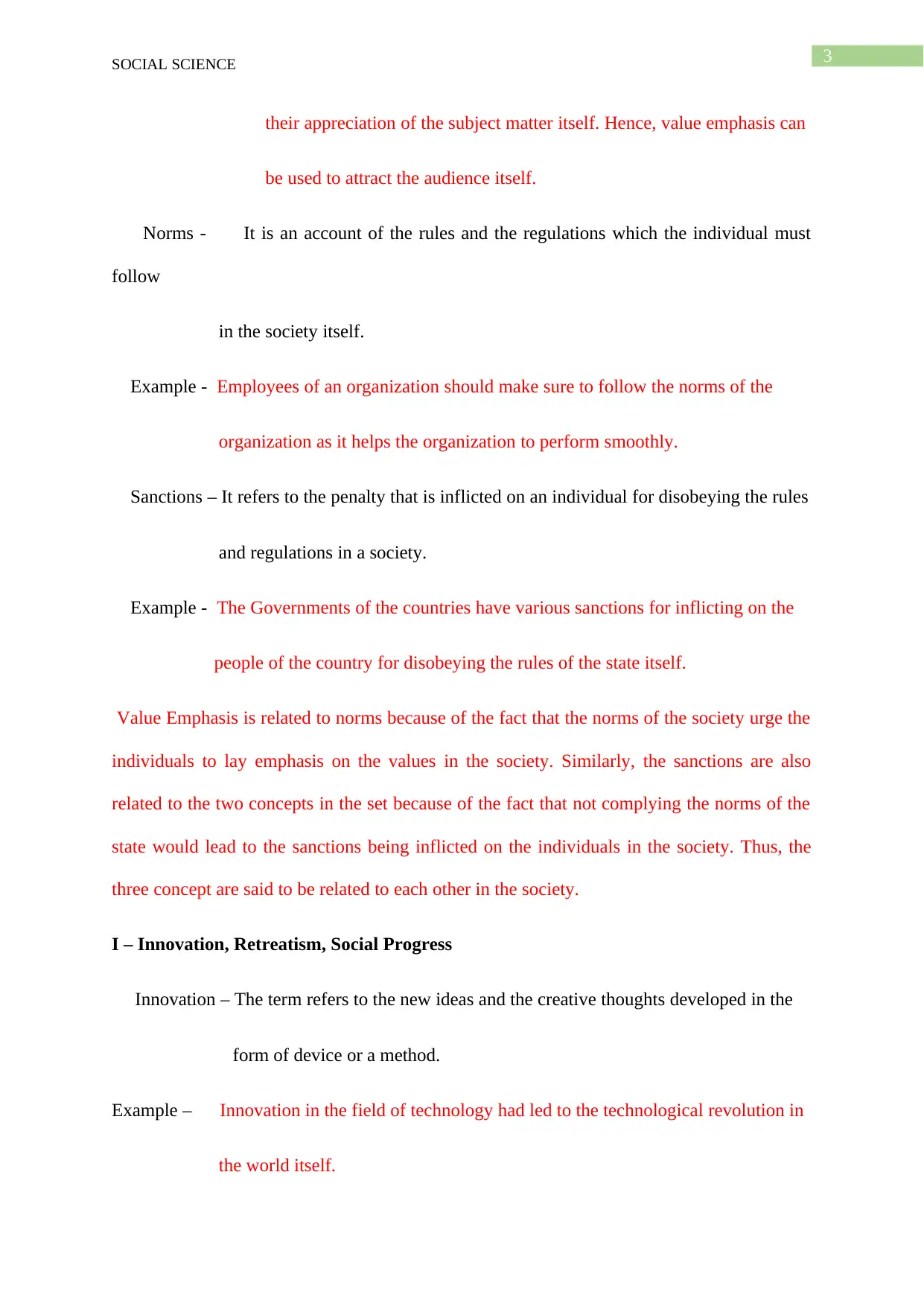
3SOCIAL SCIENCE
their appreciation of the subject matter itself. Hence, value emphasis can
be used to attract the audience itself.
Norms - It is an account of the rules and the regulations which the individual must
follow
in the society itself.
Example - Employees of an organization should make sure to follow the norms of the
organization as it helps the organization to perform smoothly.
Sanctions – It refers to the penalty that is inflicted on an individual for disobeying the rules
and regulations in a society.
Example - The Governments of the countries have various sanctions for inflicting on the
people of the country for disobeying the rules of the state itself.
Value Emphasis is related to norms because of the fact that the norms of the society urge the
individuals to lay emphasis on the values in the society. Similarly, the sanctions are also
related to the two concepts in the set because of the fact that not complying the norms of the
state would lead to the sanctions being inflicted on the individuals in the society. Thus, the
three concept are said to be related to each other in the society.
I – Innovation, Retreatism, Social Progress
Innovation – The term refers to the new ideas and the creative thoughts developed in the
form of device or a method.
Example – Innovation in the field of technology had led to the technological revolution in
the world itself.
their appreciation of the subject matter itself. Hence, value emphasis can
be used to attract the audience itself.
Norms - It is an account of the rules and the regulations which the individual must
follow
in the society itself.
Example - Employees of an organization should make sure to follow the norms of the
organization as it helps the organization to perform smoothly.
Sanctions – It refers to the penalty that is inflicted on an individual for disobeying the rules
and regulations in a society.
Example - The Governments of the countries have various sanctions for inflicting on the
people of the country for disobeying the rules of the state itself.
Value Emphasis is related to norms because of the fact that the norms of the society urge the
individuals to lay emphasis on the values in the society. Similarly, the sanctions are also
related to the two concepts in the set because of the fact that not complying the norms of the
state would lead to the sanctions being inflicted on the individuals in the society. Thus, the
three concept are said to be related to each other in the society.
I – Innovation, Retreatism, Social Progress
Innovation – The term refers to the new ideas and the creative thoughts developed in the
form of device or a method.
Example – Innovation in the field of technology had led to the technological revolution in
the world itself.
Secure Best Marks with AI Grader
Need help grading? Try our AI Grader for instant feedback on your assignments.
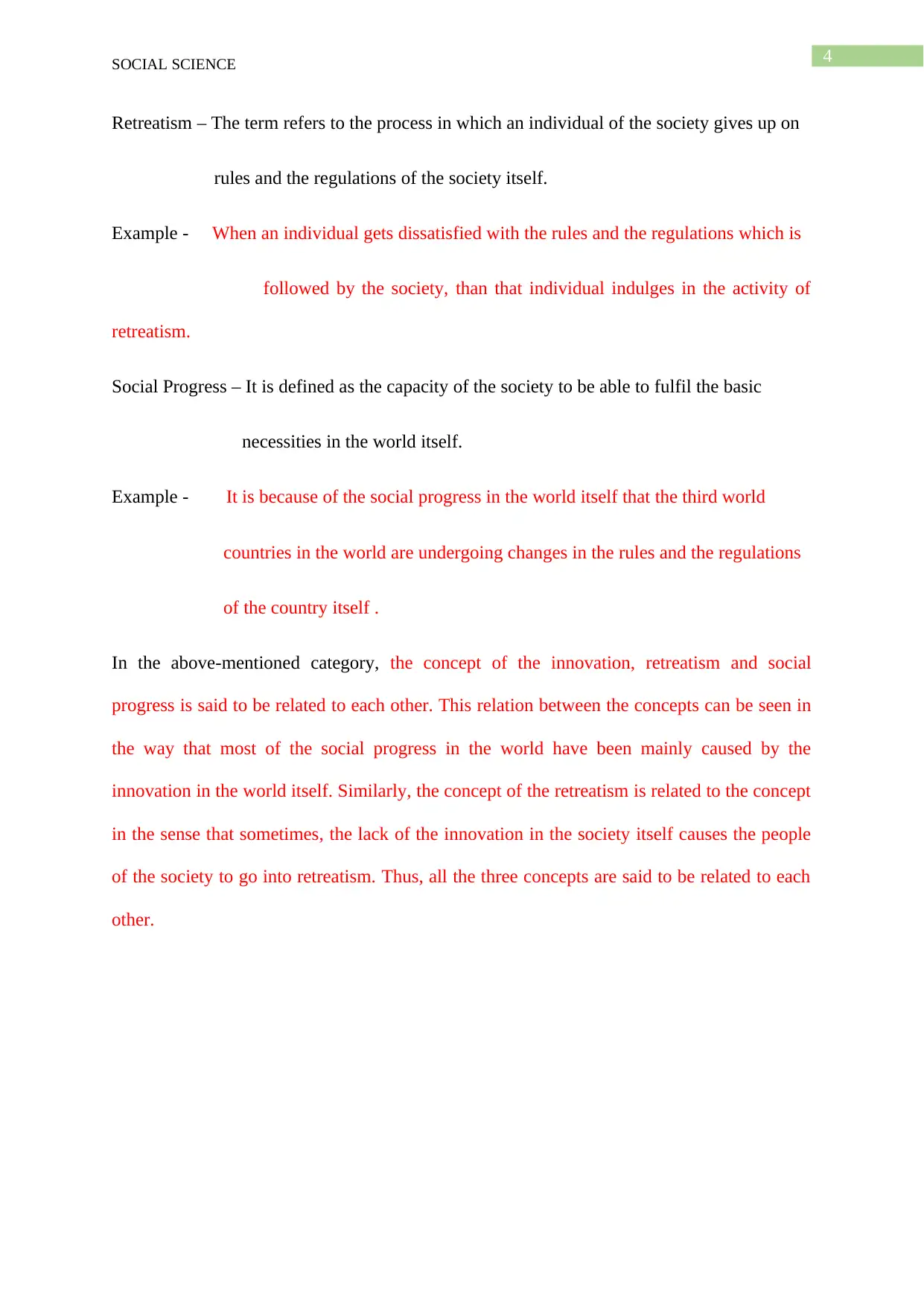
4SOCIAL SCIENCE
Retreatism – The term refers to the process in which an individual of the society gives up on
rules and the regulations of the society itself.
Example - When an individual gets dissatisfied with the rules and the regulations which is
followed by the society, than that individual indulges in the activity of
retreatism.
Social Progress – It is defined as the capacity of the society to be able to fulfil the basic
necessities in the world itself.
Example - It is because of the social progress in the world itself that the third world
countries in the world are undergoing changes in the rules and the regulations
of the country itself .
In the above-mentioned category, the concept of the innovation, retreatism and social
progress is said to be related to each other. This relation between the concepts can be seen in
the way that most of the social progress in the world have been mainly caused by the
innovation in the world itself. Similarly, the concept of the retreatism is related to the concept
in the sense that sometimes, the lack of the innovation in the society itself causes the people
of the society to go into retreatism. Thus, all the three concepts are said to be related to each
other.
Retreatism – The term refers to the process in which an individual of the society gives up on
rules and the regulations of the society itself.
Example - When an individual gets dissatisfied with the rules and the regulations which is
followed by the society, than that individual indulges in the activity of
retreatism.
Social Progress – It is defined as the capacity of the society to be able to fulfil the basic
necessities in the world itself.
Example - It is because of the social progress in the world itself that the third world
countries in the world are undergoing changes in the rules and the regulations
of the country itself .
In the above-mentioned category, the concept of the innovation, retreatism and social
progress is said to be related to each other. This relation between the concepts can be seen in
the way that most of the social progress in the world have been mainly caused by the
innovation in the world itself. Similarly, the concept of the retreatism is related to the concept
in the sense that sometimes, the lack of the innovation in the society itself causes the people
of the society to go into retreatism. Thus, all the three concepts are said to be related to each
other.
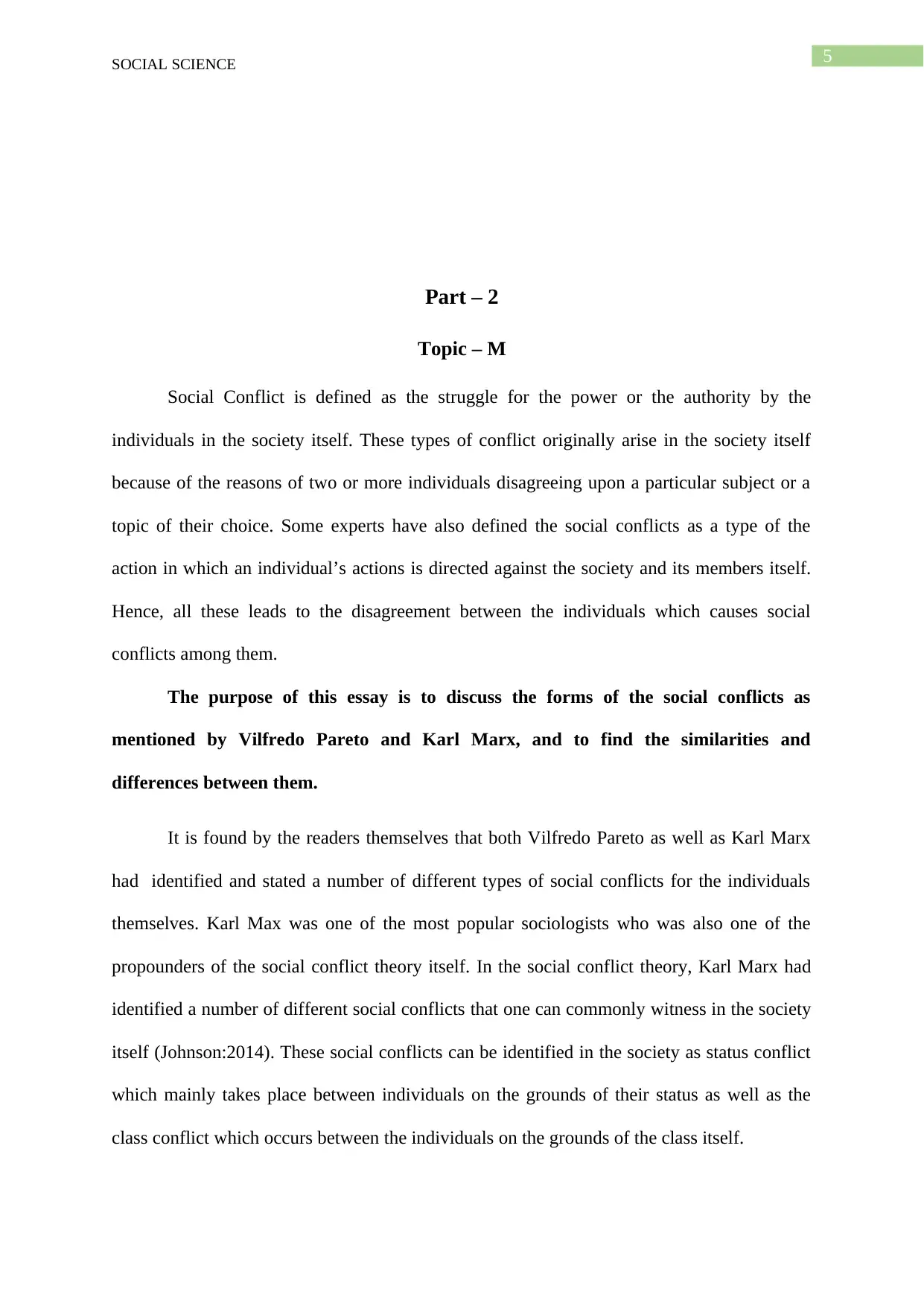
5SOCIAL SCIENCE
Part – 2
Topic – M
Social Conflict is defined as the struggle for the power or the authority by the
individuals in the society itself. These types of conflict originally arise in the society itself
because of the reasons of two or more individuals disagreeing upon a particular subject or a
topic of their choice. Some experts have also defined the social conflicts as a type of the
action in which an individual’s actions is directed against the society and its members itself.
Hence, all these leads to the disagreement between the individuals which causes social
conflicts among them.
The purpose of this essay is to discuss the forms of the social conflicts as
mentioned by Vilfredo Pareto and Karl Marx, and to find the similarities and
differences between them.
It is found by the readers themselves that both Vilfredo Pareto as well as Karl Marx
had identified and stated a number of different types of social conflicts for the individuals
themselves. Karl Max was one of the most popular sociologists who was also one of the
propounders of the social conflict theory itself. In the social conflict theory, Karl Marx had
identified a number of different social conflicts that one can commonly witness in the society
itself (Johnson:2014). These social conflicts can be identified in the society as status conflict
which mainly takes place between individuals on the grounds of their status as well as the
class conflict which occurs between the individuals on the grounds of the class itself.
Part – 2
Topic – M
Social Conflict is defined as the struggle for the power or the authority by the
individuals in the society itself. These types of conflict originally arise in the society itself
because of the reasons of two or more individuals disagreeing upon a particular subject or a
topic of their choice. Some experts have also defined the social conflicts as a type of the
action in which an individual’s actions is directed against the society and its members itself.
Hence, all these leads to the disagreement between the individuals which causes social
conflicts among them.
The purpose of this essay is to discuss the forms of the social conflicts as
mentioned by Vilfredo Pareto and Karl Marx, and to find the similarities and
differences between them.
It is found by the readers themselves that both Vilfredo Pareto as well as Karl Marx
had identified and stated a number of different types of social conflicts for the individuals
themselves. Karl Max was one of the most popular sociologists who was also one of the
propounders of the social conflict theory itself. In the social conflict theory, Karl Marx had
identified a number of different social conflicts that one can commonly witness in the society
itself (Johnson:2014). These social conflicts can be identified in the society as status conflict
which mainly takes place between individuals on the grounds of their status as well as the
class conflict which occurs between the individuals on the grounds of the class itself.
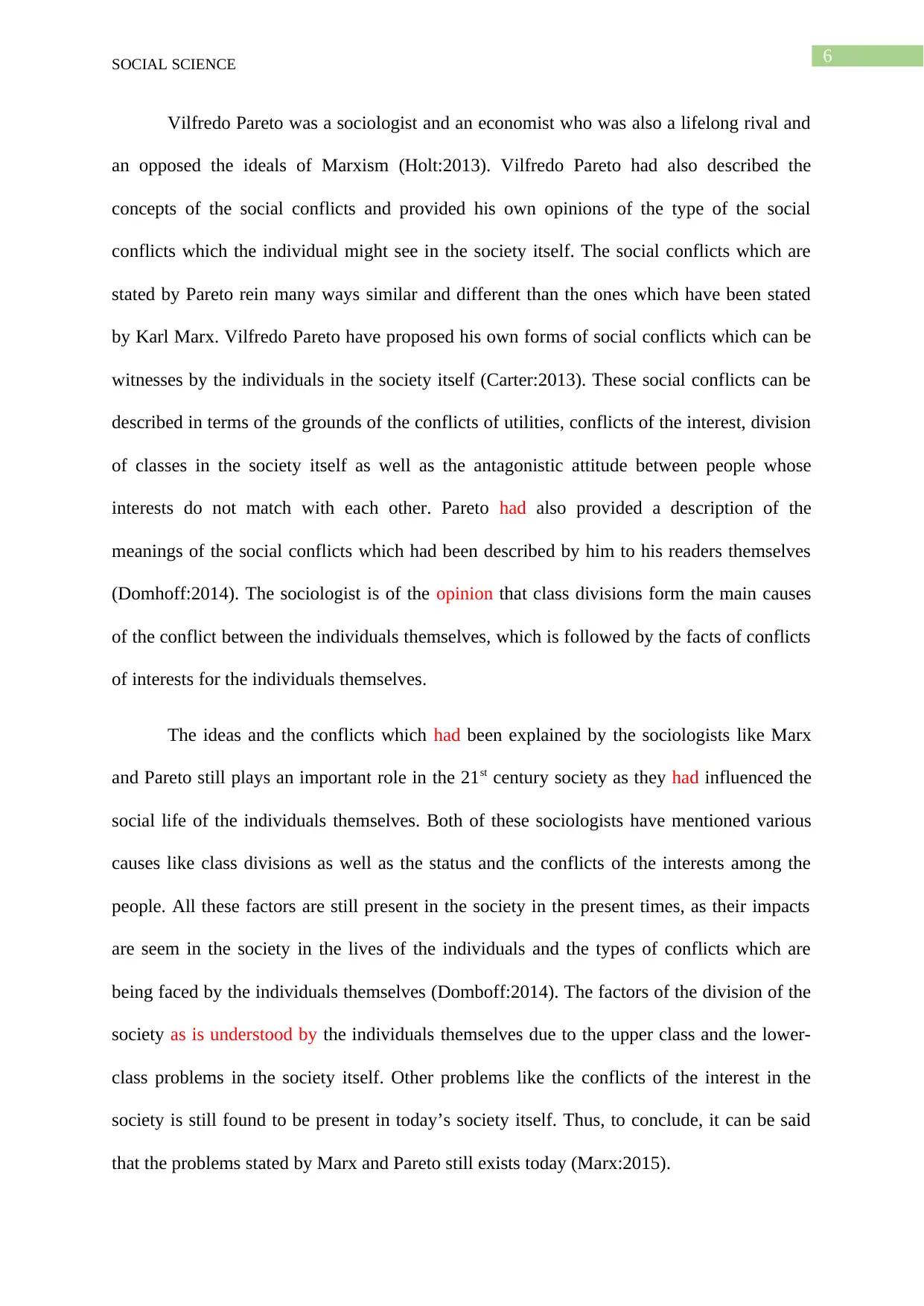
6SOCIAL SCIENCE
Vilfredo Pareto was a sociologist and an economist who was also a lifelong rival and
an opposed the ideals of Marxism (Holt:2013). Vilfredo Pareto had also described the
concepts of the social conflicts and provided his own opinions of the type of the social
conflicts which the individual might see in the society itself. The social conflicts which are
stated by Pareto rein many ways similar and different than the ones which have been stated
by Karl Marx. Vilfredo Pareto have proposed his own forms of social conflicts which can be
witnesses by the individuals in the society itself (Carter:2013). These social conflicts can be
described in terms of the grounds of the conflicts of utilities, conflicts of the interest, division
of classes in the society itself as well as the antagonistic attitude between people whose
interests do not match with each other. Pareto had also provided a description of the
meanings of the social conflicts which had been described by him to his readers themselves
(Domhoff:2014). The sociologist is of the opinion that class divisions form the main causes
of the conflict between the individuals themselves, which is followed by the facts of conflicts
of interests for the individuals themselves.
The ideas and the conflicts which had been explained by the sociologists like Marx
and Pareto still plays an important role in the 21st century society as they had influenced the
social life of the individuals themselves. Both of these sociologists have mentioned various
causes like class divisions as well as the status and the conflicts of the interests among the
people. All these factors are still present in the society in the present times, as their impacts
are seem in the society in the lives of the individuals and the types of conflicts which are
being faced by the individuals themselves (Domboff:2014). The factors of the division of the
society as is understood by the individuals themselves due to the upper class and the lower-
class problems in the society itself. Other problems like the conflicts of the interest in the
society is still found to be present in today’s society itself. Thus, to conclude, it can be said
that the problems stated by Marx and Pareto still exists today (Marx:2015).
Vilfredo Pareto was a sociologist and an economist who was also a lifelong rival and
an opposed the ideals of Marxism (Holt:2013). Vilfredo Pareto had also described the
concepts of the social conflicts and provided his own opinions of the type of the social
conflicts which the individual might see in the society itself. The social conflicts which are
stated by Pareto rein many ways similar and different than the ones which have been stated
by Karl Marx. Vilfredo Pareto have proposed his own forms of social conflicts which can be
witnesses by the individuals in the society itself (Carter:2013). These social conflicts can be
described in terms of the grounds of the conflicts of utilities, conflicts of the interest, division
of classes in the society itself as well as the antagonistic attitude between people whose
interests do not match with each other. Pareto had also provided a description of the
meanings of the social conflicts which had been described by him to his readers themselves
(Domhoff:2014). The sociologist is of the opinion that class divisions form the main causes
of the conflict between the individuals themselves, which is followed by the facts of conflicts
of interests for the individuals themselves.
The ideas and the conflicts which had been explained by the sociologists like Marx
and Pareto still plays an important role in the 21st century society as they had influenced the
social life of the individuals themselves. Both of these sociologists have mentioned various
causes like class divisions as well as the status and the conflicts of the interests among the
people. All these factors are still present in the society in the present times, as their impacts
are seem in the society in the lives of the individuals and the types of conflicts which are
being faced by the individuals themselves (Domboff:2014). The factors of the division of the
society as is understood by the individuals themselves due to the upper class and the lower-
class problems in the society itself. Other problems like the conflicts of the interest in the
society is still found to be present in today’s society itself. Thus, to conclude, it can be said
that the problems stated by Marx and Pareto still exists today (Marx:2015).
Paraphrase This Document
Need a fresh take? Get an instant paraphrase of this document with our AI Paraphraser
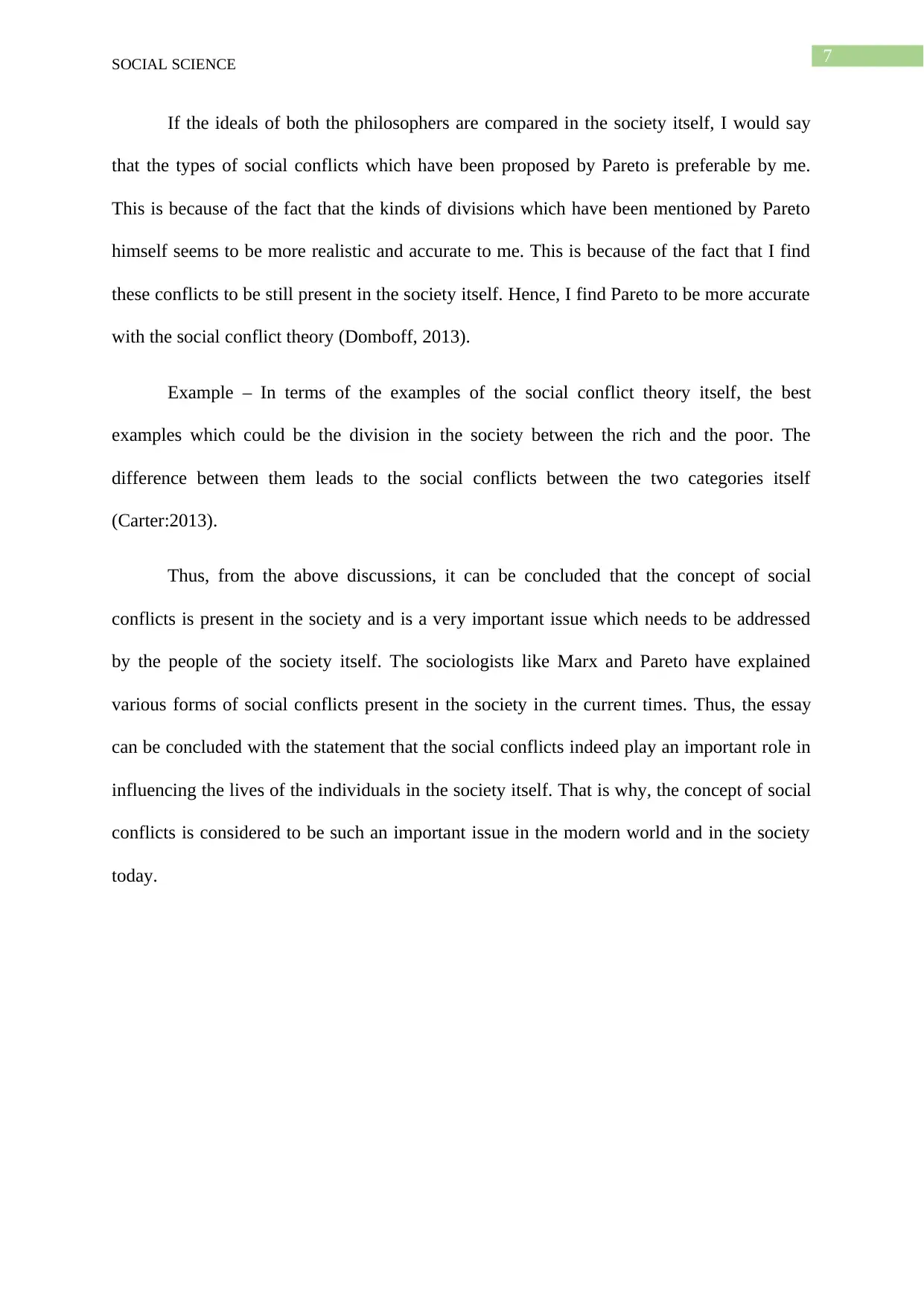
7SOCIAL SCIENCE
If the ideals of both the philosophers are compared in the society itself, I would say
that the types of social conflicts which have been proposed by Pareto is preferable by me.
This is because of the fact that the kinds of divisions which have been mentioned by Pareto
himself seems to be more realistic and accurate to me. This is because of the fact that I find
these conflicts to be still present in the society itself. Hence, I find Pareto to be more accurate
with the social conflict theory (Domboff, 2013).
Example – In terms of the examples of the social conflict theory itself, the best
examples which could be the division in the society between the rich and the poor. The
difference between them leads to the social conflicts between the two categories itself
(Carter:2013).
Thus, from the above discussions, it can be concluded that the concept of social
conflicts is present in the society and is a very important issue which needs to be addressed
by the people of the society itself. The sociologists like Marx and Pareto have explained
various forms of social conflicts present in the society in the current times. Thus, the essay
can be concluded with the statement that the social conflicts indeed play an important role in
influencing the lives of the individuals in the society itself. That is why, the concept of social
conflicts is considered to be such an important issue in the modern world and in the society
today.
If the ideals of both the philosophers are compared in the society itself, I would say
that the types of social conflicts which have been proposed by Pareto is preferable by me.
This is because of the fact that the kinds of divisions which have been mentioned by Pareto
himself seems to be more realistic and accurate to me. This is because of the fact that I find
these conflicts to be still present in the society itself. Hence, I find Pareto to be more accurate
with the social conflict theory (Domboff, 2013).
Example – In terms of the examples of the social conflict theory itself, the best
examples which could be the division in the society between the rich and the poor. The
difference between them leads to the social conflicts between the two categories itself
(Carter:2013).
Thus, from the above discussions, it can be concluded that the concept of social
conflicts is present in the society and is a very important issue which needs to be addressed
by the people of the society itself. The sociologists like Marx and Pareto have explained
various forms of social conflicts present in the society in the current times. Thus, the essay
can be concluded with the statement that the social conflicts indeed play an important role in
influencing the lives of the individuals in the society itself. That is why, the concept of social
conflicts is considered to be such an important issue in the modern world and in the society
today.
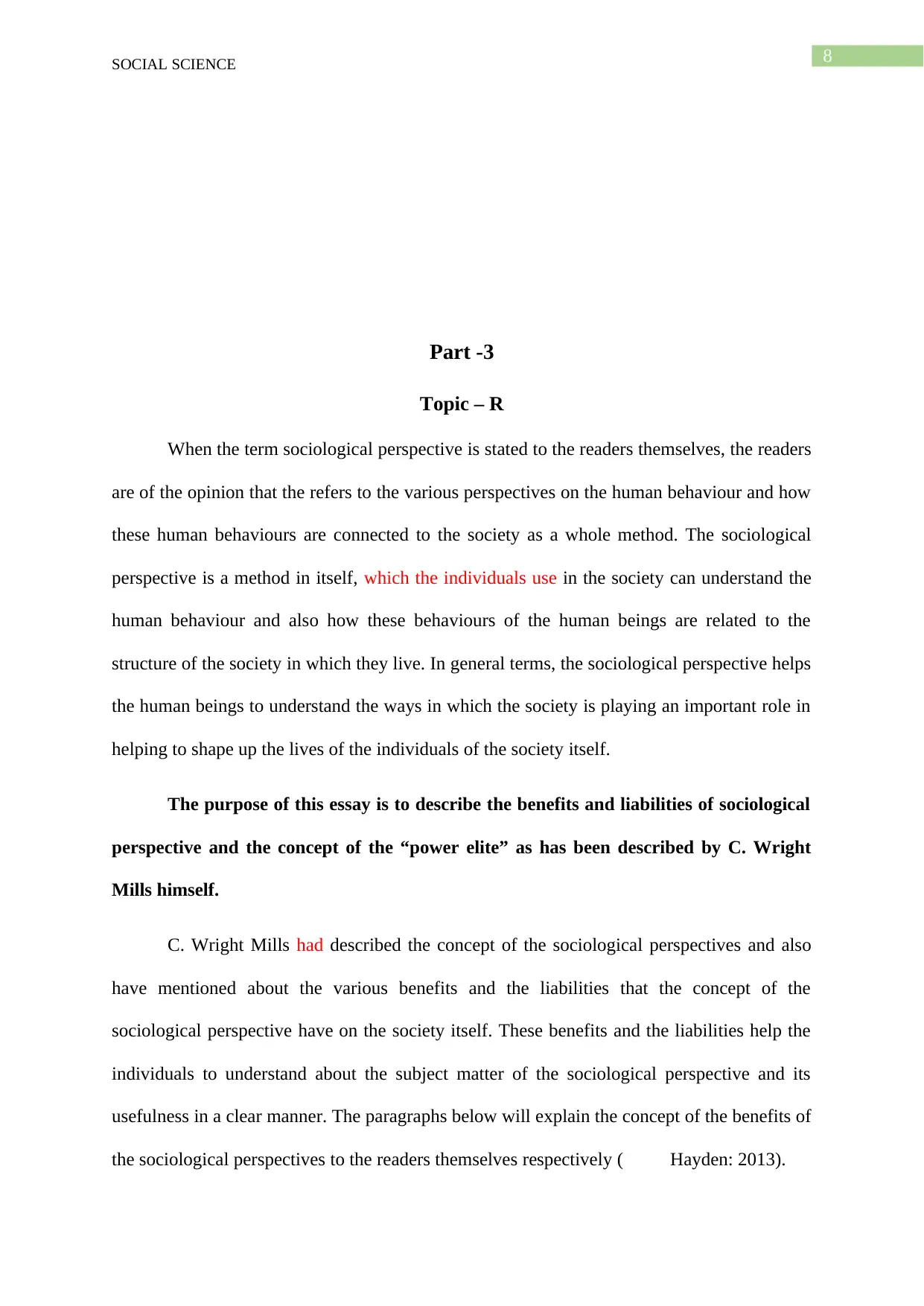
8SOCIAL SCIENCE
Part -3
Topic – R
When the term sociological perspective is stated to the readers themselves, the readers
are of the opinion that the refers to the various perspectives on the human behaviour and how
these human behaviours are connected to the society as a whole method. The sociological
perspective is a method in itself, which the individuals use in the society can understand the
human behaviour and also how these behaviours of the human beings are related to the
structure of the society in which they live. In general terms, the sociological perspective helps
the human beings to understand the ways in which the society is playing an important role in
helping to shape up the lives of the individuals of the society itself.
The purpose of this essay is to describe the benefits and liabilities of sociological
perspective and the concept of the “power elite” as has been described by C. Wright
Mills himself.
C. Wright Mills had described the concept of the sociological perspectives and also
have mentioned about the various benefits and the liabilities that the concept of the
sociological perspective have on the society itself. These benefits and the liabilities help the
individuals to understand about the subject matter of the sociological perspective and its
usefulness in a clear manner. The paragraphs below will explain the concept of the benefits of
the sociological perspectives to the readers themselves respectively ( Hayden: 2013).
Part -3
Topic – R
When the term sociological perspective is stated to the readers themselves, the readers
are of the opinion that the refers to the various perspectives on the human behaviour and how
these human behaviours are connected to the society as a whole method. The sociological
perspective is a method in itself, which the individuals use in the society can understand the
human behaviour and also how these behaviours of the human beings are related to the
structure of the society in which they live. In general terms, the sociological perspective helps
the human beings to understand the ways in which the society is playing an important role in
helping to shape up the lives of the individuals of the society itself.
The purpose of this essay is to describe the benefits and liabilities of sociological
perspective and the concept of the “power elite” as has been described by C. Wright
Mills himself.
C. Wright Mills had described the concept of the sociological perspectives and also
have mentioned about the various benefits and the liabilities that the concept of the
sociological perspective have on the society itself. These benefits and the liabilities help the
individuals to understand about the subject matter of the sociological perspective and its
usefulness in a clear manner. The paragraphs below will explain the concept of the benefits of
the sociological perspectives to the readers themselves respectively ( Hayden: 2013).
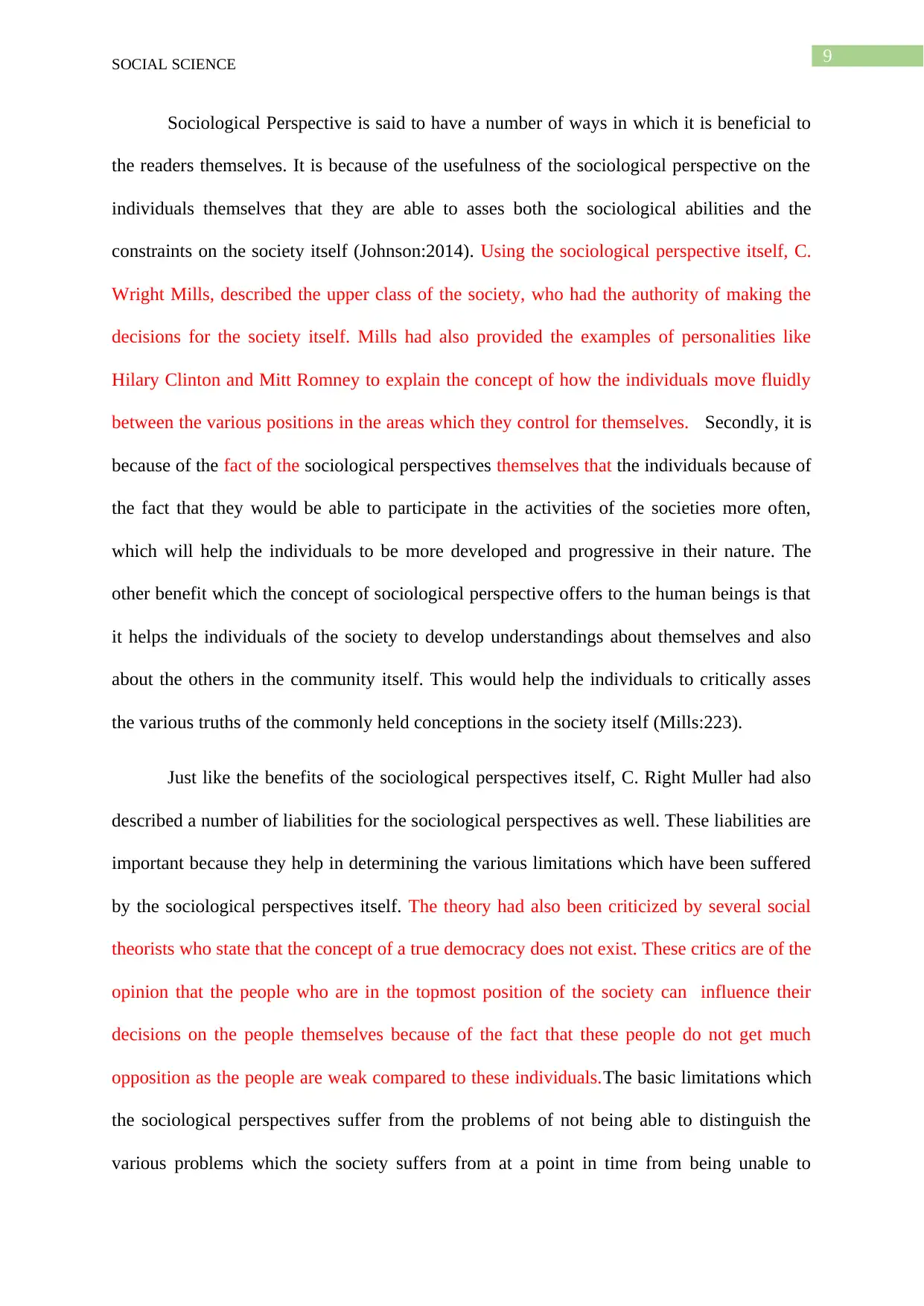
9SOCIAL SCIENCE
Sociological Perspective is said to have a number of ways in which it is beneficial to
the readers themselves. It is because of the usefulness of the sociological perspective on the
individuals themselves that they are able to asses both the sociological abilities and the
constraints on the society itself (Johnson:2014). Using the sociological perspective itself, C.
Wright Mills, described the upper class of the society, who had the authority of making the
decisions for the society itself. Mills had also provided the examples of personalities like
Hilary Clinton and Mitt Romney to explain the concept of how the individuals move fluidly
between the various positions in the areas which they control for themselves. Secondly, it is
because of the fact of the sociological perspectives themselves that the individuals because of
the fact that they would be able to participate in the activities of the societies more often,
which will help the individuals to be more developed and progressive in their nature. The
other benefit which the concept of sociological perspective offers to the human beings is that
it helps the individuals of the society to develop understandings about themselves and also
about the others in the community itself. This would help the individuals to critically asses
the various truths of the commonly held conceptions in the society itself (Mills:223).
Just like the benefits of the sociological perspectives itself, C. Right Muller had also
described a number of liabilities for the sociological perspectives as well. These liabilities are
important because they help in determining the various limitations which have been suffered
by the sociological perspectives itself. The theory had also been criticized by several social
theorists who state that the concept of a true democracy does not exist. These critics are of the
opinion that the people who are in the topmost position of the society can influence their
decisions on the people themselves because of the fact that these people do not get much
opposition as the people are weak compared to these individuals.The basic limitations which
the sociological perspectives suffer from the problems of not being able to distinguish the
various problems which the society suffers from at a point in time from being unable to
Sociological Perspective is said to have a number of ways in which it is beneficial to
the readers themselves. It is because of the usefulness of the sociological perspective on the
individuals themselves that they are able to asses both the sociological abilities and the
constraints on the society itself (Johnson:2014). Using the sociological perspective itself, C.
Wright Mills, described the upper class of the society, who had the authority of making the
decisions for the society itself. Mills had also provided the examples of personalities like
Hilary Clinton and Mitt Romney to explain the concept of how the individuals move fluidly
between the various positions in the areas which they control for themselves. Secondly, it is
because of the fact of the sociological perspectives themselves that the individuals because of
the fact that they would be able to participate in the activities of the societies more often,
which will help the individuals to be more developed and progressive in their nature. The
other benefit which the concept of sociological perspective offers to the human beings is that
it helps the individuals of the society to develop understandings about themselves and also
about the others in the community itself. This would help the individuals to critically asses
the various truths of the commonly held conceptions in the society itself (Mills:223).
Just like the benefits of the sociological perspectives itself, C. Right Muller had also
described a number of liabilities for the sociological perspectives as well. These liabilities are
important because they help in determining the various limitations which have been suffered
by the sociological perspectives itself. The theory had also been criticized by several social
theorists who state that the concept of a true democracy does not exist. These critics are of the
opinion that the people who are in the topmost position of the society can influence their
decisions on the people themselves because of the fact that these people do not get much
opposition as the people are weak compared to these individuals.The basic limitations which
the sociological perspectives suffer from the problems of not being able to distinguish the
various problems which the society suffers from at a point in time from being unable to
Secure Best Marks with AI Grader
Need help grading? Try our AI Grader for instant feedback on your assignments.
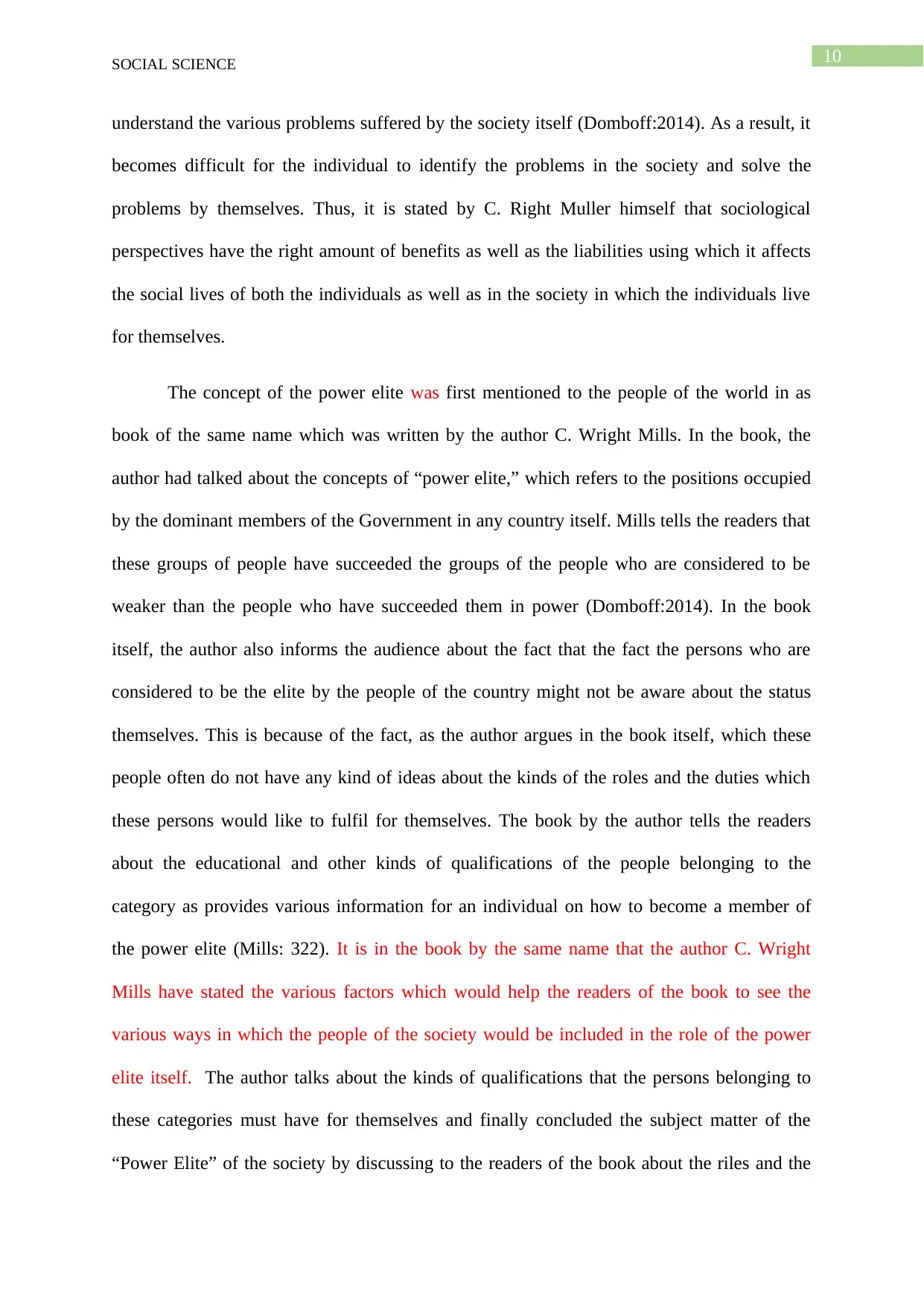
10SOCIAL SCIENCE
understand the various problems suffered by the society itself (Domboff:2014). As a result, it
becomes difficult for the individual to identify the problems in the society and solve the
problems by themselves. Thus, it is stated by C. Right Muller himself that sociological
perspectives have the right amount of benefits as well as the liabilities using which it affects
the social lives of both the individuals as well as in the society in which the individuals live
for themselves.
The concept of the power elite was first mentioned to the people of the world in as
book of the same name which was written by the author C. Wright Mills. In the book, the
author had talked about the concepts of “power elite,” which refers to the positions occupied
by the dominant members of the Government in any country itself. Mills tells the readers that
these groups of people have succeeded the groups of the people who are considered to be
weaker than the people who have succeeded them in power (Domboff:2014). In the book
itself, the author also informs the audience about the fact that the fact the persons who are
considered to be the elite by the people of the country might not be aware about the status
themselves. This is because of the fact, as the author argues in the book itself, which these
people often do not have any kind of ideas about the kinds of the roles and the duties which
these persons would like to fulfil for themselves. The book by the author tells the readers
about the educational and other kinds of qualifications of the people belonging to the
category as provides various information for an individual on how to become a member of
the power elite (Mills: 322). It is in the book by the same name that the author C. Wright
Mills have stated the various factors which would help the readers of the book to see the
various ways in which the people of the society would be included in the role of the power
elite itself. The author talks about the kinds of qualifications that the persons belonging to
these categories must have for themselves and finally concluded the subject matter of the
“Power Elite” of the society by discussing to the readers of the book about the riles and the
understand the various problems suffered by the society itself (Domboff:2014). As a result, it
becomes difficult for the individual to identify the problems in the society and solve the
problems by themselves. Thus, it is stated by C. Right Muller himself that sociological
perspectives have the right amount of benefits as well as the liabilities using which it affects
the social lives of both the individuals as well as in the society in which the individuals live
for themselves.
The concept of the power elite was first mentioned to the people of the world in as
book of the same name which was written by the author C. Wright Mills. In the book, the
author had talked about the concepts of “power elite,” which refers to the positions occupied
by the dominant members of the Government in any country itself. Mills tells the readers that
these groups of people have succeeded the groups of the people who are considered to be
weaker than the people who have succeeded them in power (Domboff:2014). In the book
itself, the author also informs the audience about the fact that the fact the persons who are
considered to be the elite by the people of the country might not be aware about the status
themselves. This is because of the fact, as the author argues in the book itself, which these
people often do not have any kind of ideas about the kinds of the roles and the duties which
these persons would like to fulfil for themselves. The book by the author tells the readers
about the educational and other kinds of qualifications of the people belonging to the
category as provides various information for an individual on how to become a member of
the power elite (Mills: 322). It is in the book by the same name that the author C. Wright
Mills have stated the various factors which would help the readers of the book to see the
various ways in which the people of the society would be included in the role of the power
elite itself. The author talks about the kinds of qualifications that the persons belonging to
these categories must have for themselves and finally concluded the subject matter of the
“Power Elite” of the society by discussing to the readers of the book about the riles and the
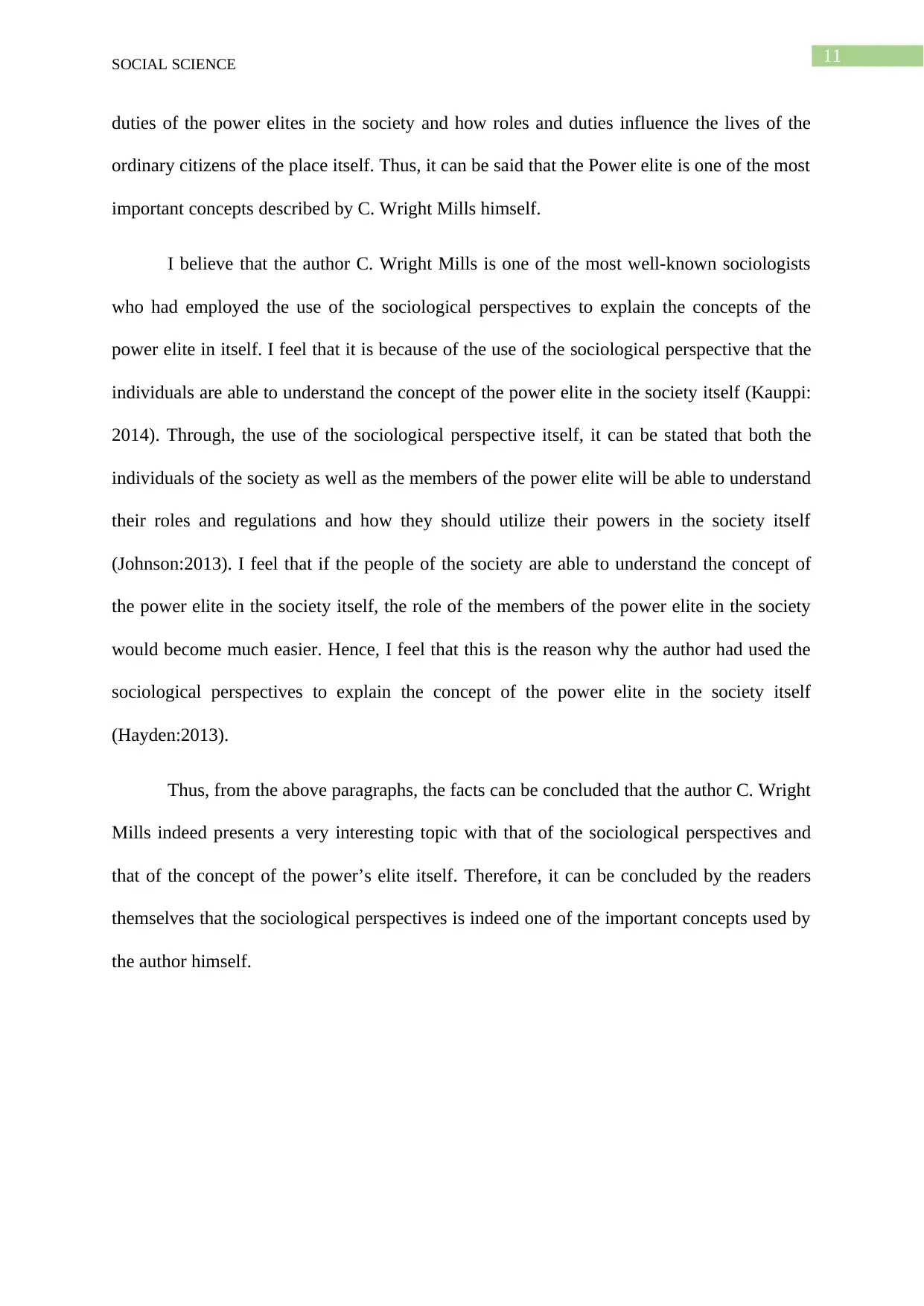
11SOCIAL SCIENCE
duties of the power elites in the society and how roles and duties influence the lives of the
ordinary citizens of the place itself. Thus, it can be said that the Power elite is one of the most
important concepts described by C. Wright Mills himself.
I believe that the author C. Wright Mills is one of the most well-known sociologists
who had employed the use of the sociological perspectives to explain the concepts of the
power elite in itself. I feel that it is because of the use of the sociological perspective that the
individuals are able to understand the concept of the power elite in the society itself (Kauppi:
2014). Through, the use of the sociological perspective itself, it can be stated that both the
individuals of the society as well as the members of the power elite will be able to understand
their roles and regulations and how they should utilize their powers in the society itself
(Johnson:2013). I feel that if the people of the society are able to understand the concept of
the power elite in the society itself, the role of the members of the power elite in the society
would become much easier. Hence, I feel that this is the reason why the author had used the
sociological perspectives to explain the concept of the power elite in the society itself
(Hayden:2013).
Thus, from the above paragraphs, the facts can be concluded that the author C. Wright
Mills indeed presents a very interesting topic with that of the sociological perspectives and
that of the concept of the power’s elite itself. Therefore, it can be concluded by the readers
themselves that the sociological perspectives is indeed one of the important concepts used by
the author himself.
duties of the power elites in the society and how roles and duties influence the lives of the
ordinary citizens of the place itself. Thus, it can be said that the Power elite is one of the most
important concepts described by C. Wright Mills himself.
I believe that the author C. Wright Mills is one of the most well-known sociologists
who had employed the use of the sociological perspectives to explain the concepts of the
power elite in itself. I feel that it is because of the use of the sociological perspective that the
individuals are able to understand the concept of the power elite in the society itself (Kauppi:
2014). Through, the use of the sociological perspective itself, it can be stated that both the
individuals of the society as well as the members of the power elite will be able to understand
their roles and regulations and how they should utilize their powers in the society itself
(Johnson:2013). I feel that if the people of the society are able to understand the concept of
the power elite in the society itself, the role of the members of the power elite in the society
would become much easier. Hence, I feel that this is the reason why the author had used the
sociological perspectives to explain the concept of the power elite in the society itself
(Hayden:2013).
Thus, from the above paragraphs, the facts can be concluded that the author C. Wright
Mills indeed presents a very interesting topic with that of the sociological perspectives and
that of the concept of the power’s elite itself. Therefore, it can be concluded by the readers
themselves that the sociological perspectives is indeed one of the important concepts used by
the author himself.
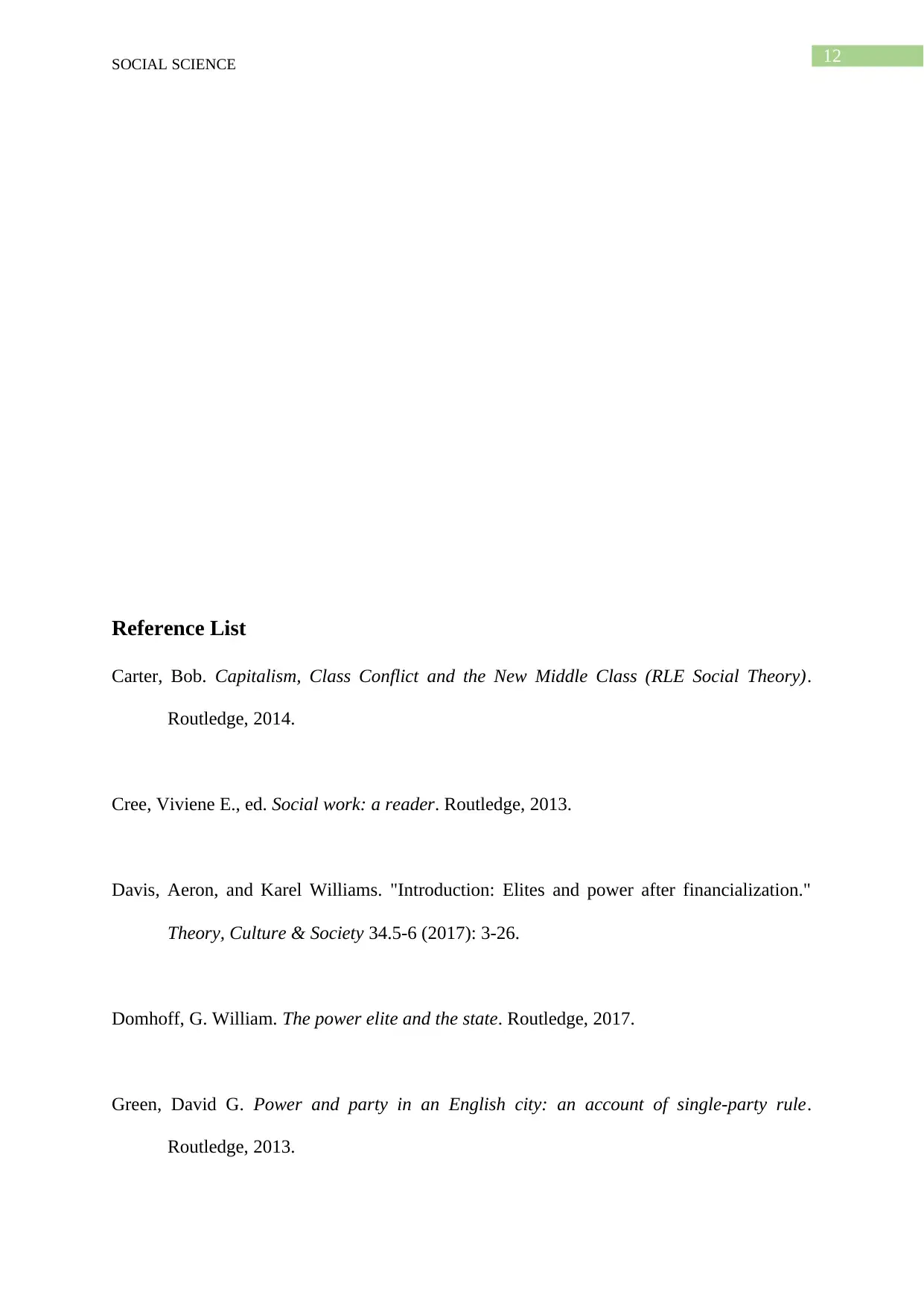
12SOCIAL SCIENCE
Reference List
Carter, Bob. Capitalism, Class Conflict and the New Middle Class (RLE Social Theory).
Routledge, 2014.
Cree, Viviene E., ed. Social work: a reader. Routledge, 2013.
Davis, Aeron, and Karel Williams. "Introduction: Elites and power after financialization."
Theory, Culture & Society 34.5-6 (2017): 3-26.
Domhoff, G. William. The power elite and the state. Routledge, 2017.
Green, David G. Power and party in an English city: an account of single-party rule.
Routledge, 2013.
Reference List
Carter, Bob. Capitalism, Class Conflict and the New Middle Class (RLE Social Theory).
Routledge, 2014.
Cree, Viviene E., ed. Social work: a reader. Routledge, 2013.
Davis, Aeron, and Karel Williams. "Introduction: Elites and power after financialization."
Theory, Culture & Society 34.5-6 (2017): 3-26.
Domhoff, G. William. The power elite and the state. Routledge, 2017.
Green, David G. Power and party in an English city: an account of single-party rule.
Routledge, 2013.
Paraphrase This Document
Need a fresh take? Get an instant paraphrase of this document with our AI Paraphraser
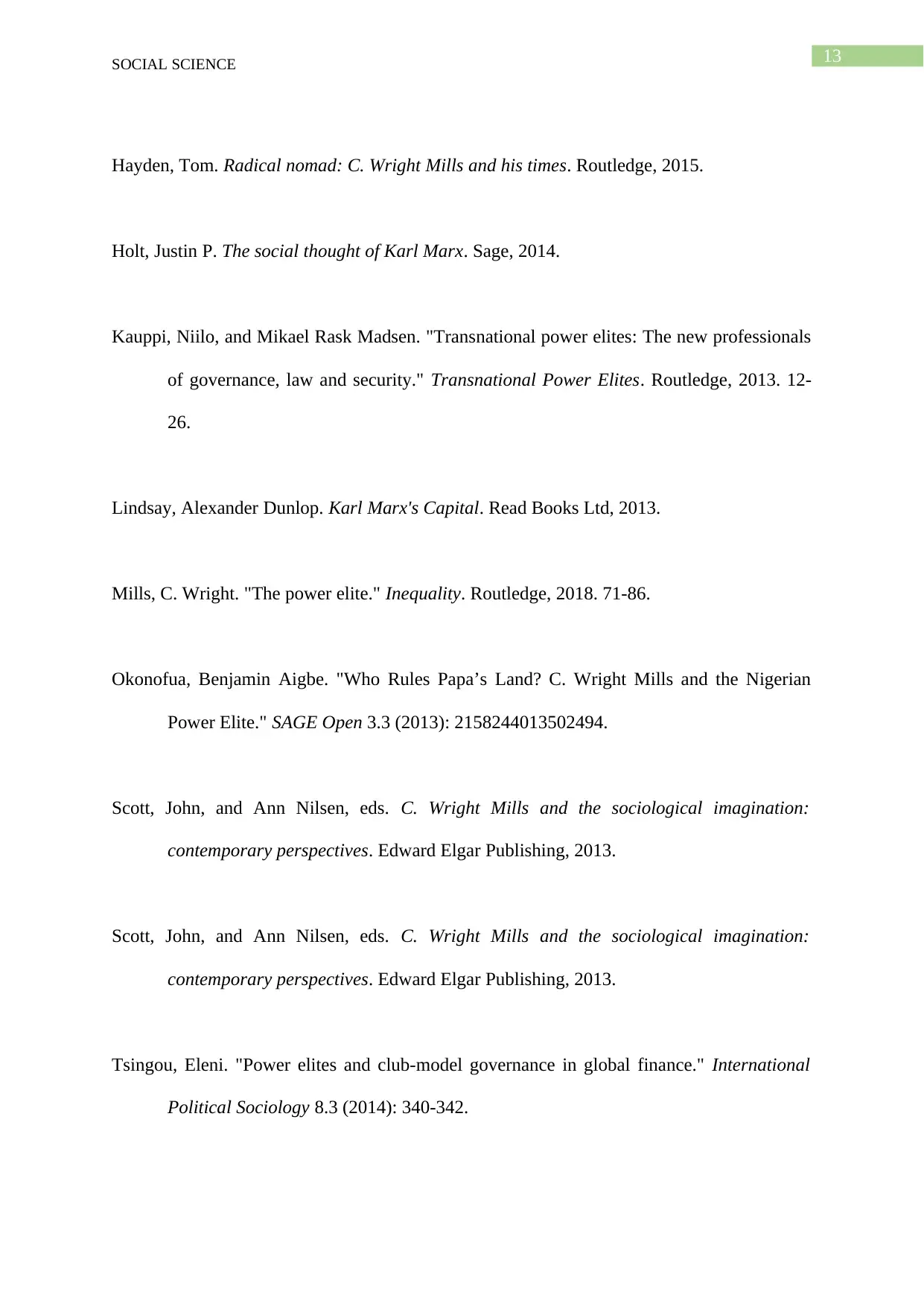
13SOCIAL SCIENCE
Hayden, Tom. Radical nomad: C. Wright Mills and his times. Routledge, 2015.
Holt, Justin P. The social thought of Karl Marx. Sage, 2014.
Kauppi, Niilo, and Mikael Rask Madsen. "Transnational power elites: The new professionals
of governance, law and security." Transnational Power Elites. Routledge, 2013. 12-
26.
Lindsay, Alexander Dunlop. Karl Marx's Capital. Read Books Ltd, 2013.
Mills, C. Wright. "The power elite." Inequality. Routledge, 2018. 71-86.
Okonofua, Benjamin Aigbe. "Who Rules Papa’s Land? C. Wright Mills and the Nigerian
Power Elite." SAGE Open 3.3 (2013): 2158244013502494.
Scott, John, and Ann Nilsen, eds. C. Wright Mills and the sociological imagination:
contemporary perspectives. Edward Elgar Publishing, 2013.
Scott, John, and Ann Nilsen, eds. C. Wright Mills and the sociological imagination:
contemporary perspectives. Edward Elgar Publishing, 2013.
Tsingou, Eleni. "Power elites and club-model governance in global finance." International
Political Sociology 8.3 (2014): 340-342.
Hayden, Tom. Radical nomad: C. Wright Mills and his times. Routledge, 2015.
Holt, Justin P. The social thought of Karl Marx. Sage, 2014.
Kauppi, Niilo, and Mikael Rask Madsen. "Transnational power elites: The new professionals
of governance, law and security." Transnational Power Elites. Routledge, 2013. 12-
26.
Lindsay, Alexander Dunlop. Karl Marx's Capital. Read Books Ltd, 2013.
Mills, C. Wright. "The power elite." Inequality. Routledge, 2018. 71-86.
Okonofua, Benjamin Aigbe. "Who Rules Papa’s Land? C. Wright Mills and the Nigerian
Power Elite." SAGE Open 3.3 (2013): 2158244013502494.
Scott, John, and Ann Nilsen, eds. C. Wright Mills and the sociological imagination:
contemporary perspectives. Edward Elgar Publishing, 2013.
Scott, John, and Ann Nilsen, eds. C. Wright Mills and the sociological imagination:
contemporary perspectives. Edward Elgar Publishing, 2013.
Tsingou, Eleni. "Power elites and club-model governance in global finance." International
Political Sociology 8.3 (2014): 340-342.
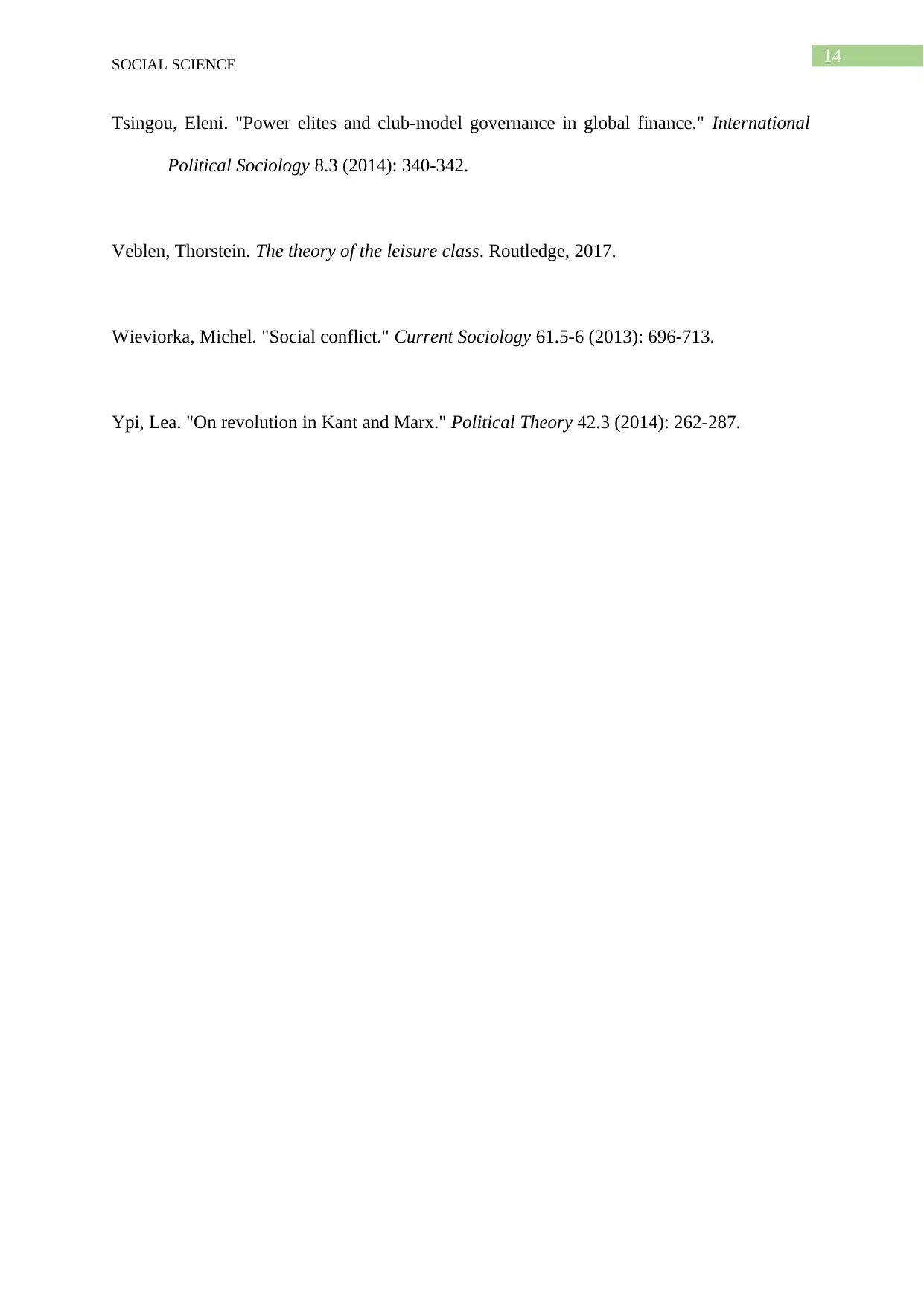
14SOCIAL SCIENCE
Tsingou, Eleni. "Power elites and club-model governance in global finance." International
Political Sociology 8.3 (2014): 340-342.
Veblen, Thorstein. The theory of the leisure class. Routledge, 2017.
Wieviorka, Michel. "Social conflict." Current Sociology 61.5-6 (2013): 696-713.
Ypi, Lea. "On revolution in Kant and Marx." Political Theory 42.3 (2014): 262-287.
Tsingou, Eleni. "Power elites and club-model governance in global finance." International
Political Sociology 8.3 (2014): 340-342.
Veblen, Thorstein. The theory of the leisure class. Routledge, 2017.
Wieviorka, Michel. "Social conflict." Current Sociology 61.5-6 (2013): 696-713.
Ypi, Lea. "On revolution in Kant and Marx." Political Theory 42.3 (2014): 262-287.
1 out of 15
Related Documents
Your All-in-One AI-Powered Toolkit for Academic Success.
+13062052269
info@desklib.com
Available 24*7 on WhatsApp / Email
![[object Object]](/_next/static/media/star-bottom.7253800d.svg)
Unlock your academic potential
© 2024 | Zucol Services PVT LTD | All rights reserved.





